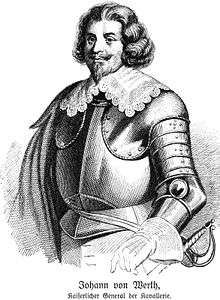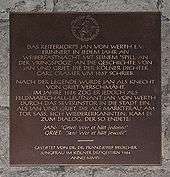Johann von Werth
Count Johann von Werth (1591 – 16 January 1652), also Jan von Werth or in French Jean de Werth, was a German general of cavalry in the Thirty Years' War.
Johann von Werth | |
|---|---|
 Johann von Werth, imperial general of cavalry | |
| Born | 1591 Büttgen, Duchy of Jülich |
| Died | 12 September 1652 Benátky nad Jizerou, Kingdom of Bohemia |
| Allegiance | Spain |
| Years of service | 1620-1648 |
| Rank | General of cavalry |
| Unit | Cuirassier |
| Battles/wars | |
Biography
Werth was born in 1591 at Büttgen in the Duchy of Jülich as the eldest son of lesser noble Johann von Wierdt († 1606) and Elisabeth Streithoven. He had eight brothers and sisters. At an early age he left home to become a soldier of fortune in the Walloon cavalry in the Spanish Netherlands. In 1622, at the taking of Jülich, he won promotion to the rank of lieutenant. He served as a colonel of cavalry in the Bavarian army in 1630. He obtained the command of a regiment, both titular and effective, in 1632, and in 1633 and 1634 laid the foundations of his reputation as a swift and terrible leader of cavalry forays. His services were even more conspicuous in the great pitched Battle of Nördlingen (1634), after which the emperor made him a Freiherr of the Empire, and the elector of Bavaria gave him the rank of lieutenant field-marshal. About this time he armed his regiment with the musket as well as the sword. [1]
.jpg)
In 1635 and 1636 Werth's forays extended into Lorraine and Luxembourg, after which he projected an expedition into the heart of France. Starting in July 1636, from the country of the lower Meuse, he raided far and wide, and even urged his commander in chief, the cardinal infante, to "plant the double eagle on the Louvre".[1] Though this was not attempted. Werth's horsemen appeared at Saint-Denis before the a French army of fifty thousand men at Compiègne forced the invaders to retreat. The memory of this raid lasted long, and the name of "Jean de Wert" figures in folk-songs and serves as a bogey to quieten unruly children.[1]
In 1637 Werth was once more in the Rhine valley, destroying convoys, relieving besieged towns and surprising the enemy's camps. In February 1638 he defeated the Weimar troops in an engagement at Rheinfelden, but shortly afterwards was made prisoner by Bernhard of Saxe-Weimar. His hopes of being exchanged for the Swedish field marshal Gustaf Horn were disappointed for Bernhard had to deliver up his captive to the French. The terrible Jean de Wert was brought to Paris, amidst great rejoicings from the country people. He was lionized by the society of the capital, visited in prison by high ladies. So light was his captivity that he said that nothing bound him but his word of honour. His release, which was delayed until March 1642 because the imperial government feared to see Horn at the head of the Swedish army and would not allow an exchange.[1]
When at last Werth reappeared in the field it was as general of cavalry in the imperial and Bavarian and Cologne services. His first campaign against the French marshal Guebriant was uneventful, but his second (1643) in which Baron Franz von Mercy was his commander-in-chief, ended with the battle of Tuttlingen in which Werth was instrumental in a surprise victory. In 1644 he was in the lower Rhine country, but he returned to Mercy's headquarters in time to fight in the battle of Freiburg. In the following year he played a decisive role in the second battle of Nördlingen. Mercy was killed in this action, and Werth temporarily commanded the defeated arm until succeeded by Field-marshal Geleen. Werth was disappointed, but remained thoroughly loyal to his soldierly code of honour, and found an outlet for his anger in renewed military activity.[1]
In 1647 differences arose between the elector and the emperor as to the allegiance due from the Bavarian troops, in which, after long hesitation, Werth, fearing that the cause of the Empire and of the Catholic religion would be ruined if the elector resumed control of the troops, attempted to take his men over the Austrian border. But they refused to follow and, escaping with great difficulty from the elector's vengeance, Werth found a refuge in Austria. The emperor was grateful for his conduct in this affair, ordered the elector to rescind his ban, and made Werth a count.[1] The last campaign of the war (1648) was uneventful, and shortly after its close he retired to live on the estates which he had bought in the course of his career, and on one of these, Benatek 40 kilometres (25 mi) NE of Prague in Bohemia, a gift from the emperor, he died on 16 of January 1652. [1] He was buried in the church of Nativity of the Virgin Mary in Benátky.
.jpg)

.jpg)
Legend of Jan and Griet
Johann von Werth's life became a popular legend in the Rhineland and Cologne that is frequently reenacted at Karneval time:
The poor peasant Jan fell in love with Griet but she wanted a wealthier partner and declined his offer of marriage. Devastated by her rejection he came upon an army recruiter and signed up to go to war. Through hard work and good fortune he rose to become a general, celebrating several victories. After taking the fort at Hermannstein he was leading his triumphant troops into Cologne through St. Severin's Gate, when he saw his former love Griet selling fruit at a market. Griet was filled with regret at turning down such a successful person and exclaimed "Jan, who would have thought it?" to which he replied "Griet, the person who should have done it!" and turns away.[2]
The story has several variants. It has inspired many songs including one in 2001 by the rock band BAP. Jan von Werth's name has been used for centuries to name military and recreational organisations, particularly groups of mounted marksmen at Schützenfests and Karneval.
Notes
- Chisholm 1911, p. 524.
- "Historisches Spiel von Jan un Griet". koeln.de (in German). NetCologne GmbH. Retrieved 3 February 2016.
References
- Attribution

- Lives F. W. Barthold (Berlin, 1826), W. von Janko (Vienna, 1874), F. Teicher (Augsburg, 1877).
External links
- "The Legend of Jan van Werth". kellscraft.com.